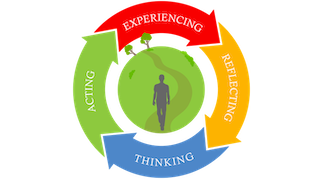Importance of Experiential Learning

Experiential learning is a philosophy and methodology in which educators purposefully engage students in direct experiences and focused reflection to increase knowledge, develop skills, and articulate values. Experiential learning is also known as learning by action, learning by doing, learning by experience, and learning by discovery and exploration.
In this way of learning, experience is fundamental. The learner becomes the center of learning. They no longer passively receive knowledge from teachers, classes, and textbooks, but voluntarily participate in the experience. And in the experience of feeling, observation, reflection, summary, and the “obtained” applied to the new life, learning situation. So experiential learning is a combination of action and thought. As the connotation of experiential learning, action and thinking are unified and cannot be treated separately. They cannot be said to come first and then consider the result. It is important to emphasize that the two cannot be treated separately, because they are mutually explanatory and interrelated.
The learning process of experiential learning is full of uncertainty, because the “experience” is new for people, the people in the experience are brand new, and the things that happen in the experience are also brand new. So the ultimate learning process and outcome are also unpredictable. Experiential education has reformed traditional didactic methods. It emphasizes the generation of experience and the enrichment of emotion. It is the teacher according to the predetermined educational objectives and content, scientific and effective to create a kind of “immersive” experience atmosphere. This enables students to realize “self-education” and “self-improvement” through “experience” actively and independently under the influence of this environmental atmosphere.
The experiential is according with my topic and my learning design method. Today’s students are advanced and they need more materials and resources to learn and understand the real world. Experiential learning takes data and concepts and uses them in practical tasks to produce practical results. If students use this information to interact and learn, it provides an authentic experience that helps them grasp it more easily and remember it for a long time. In this fast-moving world, problems can occur at any time, but with technical personnel, we can provide multiple solutions to each problem. Experiential learning enables students to engage with the creative part of their brain and use their creative solutions to solve problems. This problem-solving and innovative approach to learning produces a variety of positive outcomes that enrich the overall success of students and bring them overall success.

Great overview of the Experiential Learning approach! I really like your visual at the end! It would be helpful for readers if you could elaborate a bit more on the teaching strategies presented in the diagram to get them thinking about how they can create an environment that supports experiential learning.
I do not necessarily agree with the statement that “the ultimate learning process and outcome are also unpredictable” in the experiential learning environment. A well-designed course leads to the achievement of the desired/predictable learning outcomes, regardless of the teaching approach. The job of the teacher is to identify issues students are struggling with and guide/support their learning. Course design is both Art and Science!
Please also do not forget to provide in-text references and citations!